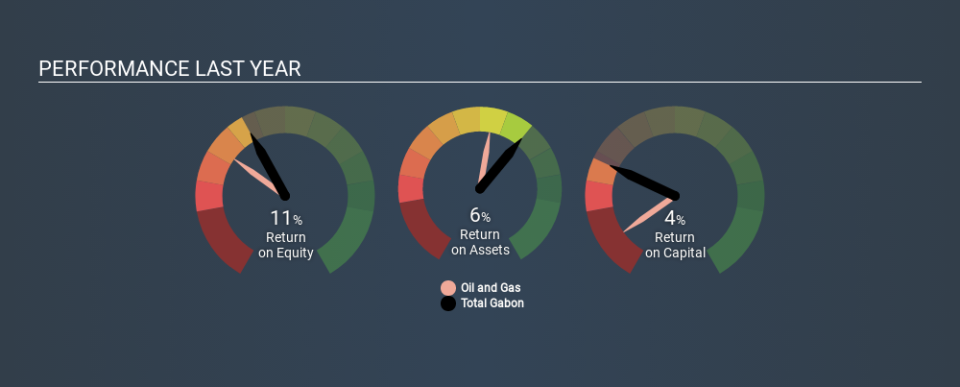Has Total Gabon (EPA:EC) Been Employing Capital Shrewdly?

Today we'll look at Total Gabon (EPA:EC) and reflect on its potential as an investment. Specifically, we'll consider its Return On Capital Employed (ROCE), since that will give us an insight into how efficiently the business can generate profits from the capital it requires.
Firstly, we'll go over how we calculate ROCE. Second, we'll look at its ROCE compared to similar companies. Finally, we'll look at how its current liabilities affect its ROCE.
What is Return On Capital Employed (ROCE)?
ROCE is a measure of a company's yearly pre-tax profit (its return), relative to the capital employed in the business. Generally speaking a higher ROCE is better. Overall, it is a valuable metric that has its flaws. Renowned investment researcher Michael Mauboussin has suggested that a high ROCE can indicate that 'one dollar invested in the company generates value of more than one dollar'.
So, How Do We Calculate ROCE?
The formula for calculating the return on capital employed is:
Return on Capital Employed = Earnings Before Interest and Tax (EBIT) ÷ (Total Assets - Current Liabilities)
Or for Total Gabon:
0.042 = US$170m ÷ (US$4.3b - US$225m) (Based on the trailing twelve months to June 2019.)
Therefore, Total Gabon has an ROCE of 4.2%.
View our latest analysis for Total Gabon
Does Total Gabon Have A Good ROCE?
One way to assess ROCE is to compare similar companies. It appears that Total Gabon's ROCE is fairly close to the Oil and Gas industry average of 5.2%. Setting aside the industry comparison for now, Total Gabon's ROCE is mediocre in absolute terms, considering the risk of investing in stocks versus the safety of a bank account. It is possible that there are more rewarding investments out there.
Total Gabon reported an ROCE of 4.2% -- better than 3 years ago, when the company didn't make a profit. That suggests the business has returned to profitability. You can click on the image below to see (in greater detail) how Total Gabon's past growth compares to other companies.
When considering ROCE, bear in mind that it reflects the past and does not necessarily predict the future. ROCE can be misleading for companies in cyclical industries, with returns looking impressive during the boom times, but very weak during the busts. ROCE is, after all, simply a snap shot of a single year. We note Total Gabon could be considered a cyclical business. You can check if Total Gabon has cyclical profits by looking at this free graph of past earnings, revenue and cash flow.
How Total Gabon's Current Liabilities Impact Its ROCE
Current liabilities include invoices, such as supplier payments, short-term debt, or a tax bill, that need to be paid within 12 months. The ROCE equation subtracts current liabilities from capital employed, so a company with a lot of current liabilities appears to have less capital employed, and a higher ROCE than otherwise. To counter this, investors can check if a company has high current liabilities relative to total assets.
Total Gabon has total liabilities of US$225m and total assets of US$4.3b. As a result, its current liabilities are equal to approximately 5.3% of its total assets. With low levels of current liabilities, at least Total Gabon's mediocre ROCE is not unduly boosted.
The Bottom Line On Total Gabon's ROCE
If performance improves, then Total Gabon may be an OK investment, especially at the right valuation. Of course, you might find a fantastic investment by looking at a few good candidates. So take a peek at this free list of companies with modest (or no) debt, trading on a P/E below 20.
For those who like to find winning investments this free list of growing companies with recent insider purchasing, could be just the ticket.
If you spot an error that warrants correction, please contact the editor at editorial-team@simplywallst.com. This article by Simply Wall St is general in nature. It does not constitute a recommendation to buy or sell any stock, and does not take account of your objectives, or your financial situation. Simply Wall St has no position in the stocks mentioned.
We aim to bring you long-term focused research analysis driven by fundamental data. Note that our analysis may not factor in the latest price-sensitive company announcements or qualitative material. Thank you for reading.


